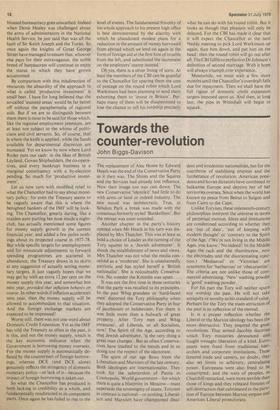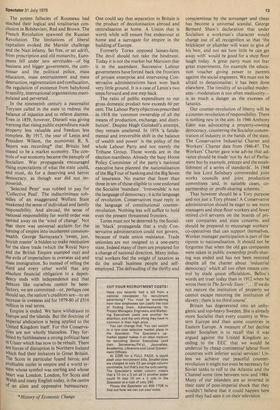Towards the counter-revolution
John Biggs-Davison
The replacement of Alec Home by Edward Heath was the end of the Conservative Party as it then was. The Shires and the Squires and the Services had already lost influence. Now their image too was cast down. The new Conservative Identikie had little to do with arms or land or indeed industry. The new mood was technocratic. True, at Selsdon Park a break was made with the consensus formerly styled 'Butskellism'. But the retreat was soon sounded.
Another chapter in the party's history opened when Mr Heath in his turn was displaced by Mrs Thatcher. This was at least as bold a choice of Leader as the turning of the Tory squires to a 'Jewish adventurer'. It shook the establishment of news and views. Mrs Thatcher was not what the media conceived as a 'moderate'. She is unashamedly patriotic and has styled herself a 'British nationalist'. She is redoubtably Conservative. No wonder the Kremlin was upset.
It was not the first time in three centuries that the party was recalled to its principles. In the past Whig grandees or 'hard-faced men' distorted the Tory philosophy when they adopted the Conservative Party in fear of jacobinism or bolshevism. For them it was little more than a bulwark of great property. After 'Tory men and Whig measures', all Liberals, or all Socialists, now! The Spirit of the Age, according to that Jewish adventurer, 'is the very thing a great man changes'.. But so often Conservatives have toadied to the trends and in so doing lost the respect of the electorate.
The spirit of our age flows from the Liberalism and Marxism of the last century. Both ideologies are internationalist. They look for the submersion of Patria in Cosmopolis. World government—for which there is quite a blueprint in Moscow—must supersede the sovereignty of states. Toryism in contrast is national—or nothing. Liberalism and Marxism have championed dissi dent and irredentist nationalities, but for the overthrow of stabilising empires and the furtherance of revolution. American presidents and Soviet dictators have combined to balkanise Europe and deprive her of her territories oversea. Since when the world has known no peace from Beirut to Saigon and from Cairo to the Cape.
Unlike Toryism, these nineteenth-century philosophies interpret the universe in terms of perpetual motion. Ideas and institutions are condemned according to whether they are 'out of date', 'out of keeping with modern thought' or 'contrary to the Spirit of the Age.' ('We're not living in the Middle Ages, you know.' No indeed! In the Middle Ages the rack and the thumbscrew, now • the electrodes and the disorientating injection.) 'Mediaeval' or 'Victorian' are synonyms for 'barbarous' or 'obscurantist'. The criteria are not unlike those of commercial advertising. 'New' washing powder is 'good' washing powder.
For his part the Tory will neither spurn nor worship the past. He will not take antiquity or novelty as his standard of value. Perhaps for the Tory the main attraction of the past is its reflection of the eternal.
It is a proper reflection whether the Liberal or the Marxist ideology has been the more destructive. They inspired the great revolutions. That armed Jacobin doctrine which Tory ministries denounced and fought wrought liberation of a kind. Europeans were freed from traditional hierarchies and corporate institutions. These fettered trade and careers, no doubt; theY also set limits to arbitrary, centralising power. Europeans were also freed to be conscripted; and the wars of peoples, as Churchill remarked, were more terrible than those of kings and they released frenzies of self-destruction that culminated in the partition of Europe between Marxist empire and American Liberal protectorate.
The potent fallacies of Rousseau had reached their logical and totalitarian conclusion in Bolshevism, Red and Brown. The French Revolution spawned the Russian Revolution. The limitations of liberal capitalism evoked the Marxist challenge and the Nazi infamy. Set free, or set adrift, from prescription and old monarchy, Europeans fell under new servitudes—of big business and bigger government, the commissar and the political police, mass education, mass entertainment and mass destruction, regimentation and confiscation, the regulation of existence from babyhood to senility, international organisations manipulated and perverted.
In the nineteenth century a paternalist Toryism called in the state to redress the balance of injustice and to relieve distress. Even in 1859, however, Disraeli was giving warning that rising public expenditure made Property less valuable and freedom less complete. By 1917, the year of Lenin and President Wilson, the economist R. S. Sayers was recording* that Britain had ceased to be a market economy. The controls of war economy became the panoply of Socialism. War propaganda encouraged rising expectations of what the state could, and must, do for a deserving and heroic democracy, as though war did not imPoverish.
'Selected Peter' was robbed to pay for 'Collective Paul'. The indiscriminate subsidies of an exaggerated Welfare State weakened the sense of individual and family responsibility. And abroad, the sense of national responsibility for world order was carried away on the 'wind of change'. Not that there was universal acclaim for the turning of empire into incoherent commonwealth. George Santayana's 'sweet, just, boyish master' is bidden to make restitution for the slave trade (which the Royal Navy and the British Empire stamped out) and the evils of imperialism in overseas aid and Mass immigration. So instead of telling the third and every other world that any absolute financial obligation to a dependency ends with independence and that debtors like ourselves cannot be benefactors, we are committed—or, perhaps one Should say, the nation's creditors are—to an Increase in overseas aid for 1979-80 of E516 Million in real terms.
Empire is ended. We have withdrawn to Europe and theislands. But the doctrine of Imperial abdication is being applied to the United Kingdom itself. For this Conservatives are not wholly blameless. They forkited by faithlessness a strong political base In Ulster which has now to be rebuilt. There are forces of disruption in Northern Ireland Which find their imitators in Great Britain. The Scots in particular found heroic and Profitable outlet in empire and a world system whose symbol was sterling and whose heart was London. London, for Scots and Welsh and many English today, is the centre of an alien and oppressive bureaucracy.
One could say that separation in Britain is the product of decolonisation abroad and centralisation at home. A Union that is worth while will ensure free endeavour at home and a surrogate for empire in the building of Europe.
Formerly Tories opposed laissez-faire. The devil should not take the hindmost. Today it is not the market but Marxism that is in the ascendant. Successive Labour governments have forced back the frontiers of private enterprise and intervening Conservative administrations have won back very little ground. It is a case of Lenin's two steps forward and one step back.
The ratio of public expenditure to our gross domestic product now exceeds 60 per cent. The Labour Party objectives prescribed in 1918 the 'common ownership of all the means of production, exchange, and distribution'. Despite Hugh Gaitskell's attempt, they remain unaltered. In 1976 'a fundamental and irreversible shift in the balance of wealth and power' is the policy of the whole Labour Party and not merely the Tribune Group. Those words are in the election manifesto. Already the busy Home Policy Committee of the party's national executive have planned the nationalisation of the Big Four of banking and the Big Seven of insurance. No matter that fewer than three in ten of those eligible to vote endorsed the Socialist `mandate'. 'Irreversible' is not the language of democracy ; it is the language of revolution. Conservatives must reply in the language of constitutional counterrevolution. Nothing less will suffice to hold even the present threatened frontiers.
Tories must not be deterred by the Socialist 'black' propaganda that a truly Conservative administration could not govern, because of trade union resistance. Trade unionists are not resigned to a one-party state. Indeed many of them are prepared for a change of national direction. Many industrial workers feel the weight of taxation as do the small business people and selfemployed. The defrauding of the thrifty and conscientious by the scrounger and cheat has become a universal scandal. George Bernard Shaw's declaration that under Socialism a workman's character would change out of all recognition so that 'the bricklayer or plumber will want to give of his best, and not see how little he can get away with' would be good for a shop floor laugh today. A great party must not fear great experiments, for example the education voucher giving power to parents against the social engineers. We must not be afraid to denationalise; it has been done elsewhere. The timidity of so-called moderates—moderation is too often mediocrity— is as much a danger as the excesses of fanatics.
Our counter-revolution of liberty will be a counter-revolution of responsibility. There is nothing new in the aim. In 1946 Anthony Eden was advocating a property-owning democracy, countering the Socialist concentration of industry in the hands of the state. The Conservative Industrial Charter and Workers' Charter date from 1946-47. The Workers' Charter gave wise advise that advance should be made 'not by Act of Parliament but by example, precept and the establishment of a series of standards'. In 1948 the late Lord Salisbury commended joint works councils and joint production committees 'and, in suitable cases, copartnership or profit-sharing schemes.'
That however should be a Tory purpose and not just a Tory phrase! A Conservative administration should be eager to see more managers and shop floor workers and fewer retired civil servants on the boards of private companies and state concerns and should be prepared to encourage workers' co-operatives that can support themselves. Worker/manager participation is part of the riposte to nationalisation. It should not be forgotten that when the old gas companies were taken in public ownership profit-sharing was ended and has not been restored despite all the chatter about 'industrial democracy' which all too often means control by trade union officialdom. Belloc's words are truer today than in 1912 when he wrote them in The Servile State:' ...If we do not restore the institution of property we cannot escape restoring the institution of slavery; there is no third course'.
Britain has degenerated into an unhygienic and top-heavy Sweden. She is already more Socialist than every country in Western Europe and than some countries in Eastern Europe. A measure of her decline under Socialism is to recall that it was argued against the United Kingdom acceding to the EEC that we would be undercut by cheap continental labour from countries with inferior social services! Unless we achieve our peaceful counterrevolution it might not even be necessary for Soviet tanks to roll to the Atlantic and the Channel some time between now and 1984. Many of our islanders are so inverted in their state of post-imperial shock that they wouldn't believe that it could happen here until they had seen it on their television.



































 Previous page
Previous page